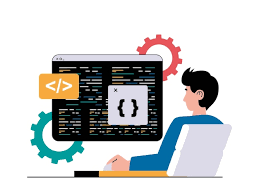.png)
.png)
Php
Php
PHP (Hypertext Preprocessor) is a widely-used open-source server-side scripting language designed for web development. It is embedded in HTML and is commonly used to create dynamic web pages. PHP scripts are executed on the server, generating HTML that is then sent to the client's web browser for rendering. Here are some key aspects and features of PHP:
Syntax: PHP syntax is similar to C, Java, and Perl, making it relatively easy for developers to learn if they have experience with other programming languages. PHP code is embedded within HTML and is delimited by <?php ... ?> tags.
Server-Side Scripting: PHP is primarily used for server-side scripting, allowing developers to create dynamic web pages by processing data on the server before sending it to the client's browser. This contrasts with client-side scripting languages like JavaScript, which run in the browser.
Variable Types: PHP is a loosely typed language, meaning that variables do not need to be explicitly declared with a data type. Variable types are determined dynamically based on the content assigned to them.
Extensive Library Support: PHP has a vast standard library that includes modules for database access, file handling, encryption, XML parsing, and more. Additionally, there is a rich ecosystem of third-party libraries and frameworks available for various purposes.
Database Integration: PHP has built-in support for a wide range of databases, including MySQL, PostgreSQL, SQLite, and others. Database connectivity is facilitated through extensions such as MySQLi and PDO.
Web Server Compatibility: PHP is compatible with various web servers, including Apache, Nginx, and Microsoft IIS. It can be run on different operating systems, such as Linux, Windows, and macOS.
Session Management: PHP supports session management, allowing developers to store and retrieve data across multiple pages during a user's visit. This is essential for creating user authentication and maintaining user state.
Security Features: PHP has security features such as data sanitization functions, input validation, and features like the PHP Filter extension to help prevent common security vulnerabilities.
Object-Oriented Programming (OOP): PHP supports object-oriented programming, allowing developers to create reusable and modular code through the use of classes and objects.
Community and Documentation: PHP has a large and active community of developers, and there is extensive documentation available on the official PHP website. This community support contributes to the ongoing development and improvement of the language.
PHP is commonly used for creating dynamic websites, web applications, content management systems (e.g., WordPress, Joomla), and e-commerce platforms. While PHP has faced criticisms for some historical security issues, ongoing updates and best practices in coding help mitigate these concerns. It remains a popular choice for web development, especially for projects that require server-side processing and interaction with databases.




